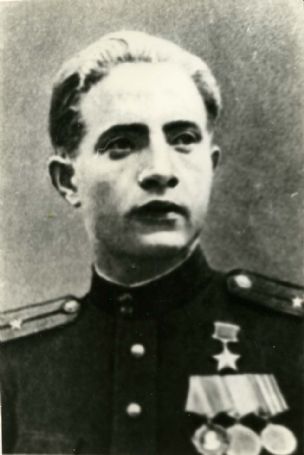Grigorii Ushpoli (Ushpolis) was born as Hirsz Uszpol in 1923 in the village of Daugieliszki Nowe, northeastern Poland (now Naujasis Daugėliškis, Lithuania). His family worked in agriculture. As a majority of the Jewish boys in this area, Hirsz studied in a heder. Later he was sent to Vilna, to study in a yeshiva. Hirsz was not successful in his religious studies there and three months later, to the chagrin of his family, he returned to his hometown During the Soviet occupation of the area in 1939-1941, he joined the Komsomol (the Young Communist League) and became a Soviet sympathizer.
With the beginning of Operation Barbarossa, Hirsz and his two sisters fled Naujasis Daugėliškis, leaving behind their parents and younger brothers, none of whom survived the war. The group of the young people with whom they were leaving succeeded in crossing the Zapadnaia Dvina River in Belorussia and eventually arrived in Tataria (more than 500 kilometers east of Moscow). There Hirsz attempted to enlist in the Red Army, but was rejected because the Soviets did not trust "Westerners," – those who came from the recently annexed territories. Hirsz Uszpol found an opportunity to enlist with the formation of the 16th Lithuanian Division in December 1941. In February 1942, he was assigned to this division and sent to the town of Balakhna, Gorky (now Nizhnii Novgorod) Region, where the formation of the division was taking place. To Hirsz's surprise, a third of the Lithuanian Division's men were Jews, most of them – privates. Balakhna's residents were even more surprised to see so many Jewish soldiers:
"They looked at us with amazement because this was the first time that they saw so many Jews who were Red Army privates. At that time, there was a rumor that circulated throughout Russia that the Jews were not fighting, but hiding deep in the rear, and now, the residents of Balakhna suddenly saw real Jews who were marching around the town! Little by little, they became reconciled to the Jewish 'invasion' and treated us in a friendly manner. Even the girls befriended the Jewish warriors.'' 1
Because of the agricultural way of life of his family, Hirsz Uszpol was one of the few draftees who knew how to handle horses. Therefore, he was assigned to a battery of 76-mm anti-tank cannons of the 249th Regiment, whose very heavy cannons were horse-drawn. There he became an anti-tank gunner, the commander of a gun battery.
The 16th Lithuanian Division, and Uszpol with it, first took part in copmbat in February 1943, during the battle of Alekseevka, near Orel, in southern Russia. In this ill-prepared operation, almost half of the division's men were killed or wounded. The percentage of Jews in the division dropped accordingly. Later the Lithuanian Division took part in the Kursk Salient operation of July 1943; there Uszpol was seriously wounded and contused. He spent three months in hospital, and returned to the 16th Division only at the end of the year, when the division was fighting in Belorussia. In the summer of 1944, the division entered Lithuania. Uszpol was given leave from his regiment to visit his home village, on the condition that he would refrain from any "funny business," like trying to take revenge on any perpetrators of atrocities against his people. During his visit to Naujasis Daugėliškis, Uszpol learned that his family had been killed by local Lithuanian collaborators.
Later, Uszpol took part in the battles for Šiauliai, northern Lithuania, then in ones on the Lithuanian-Eastern Prussian border. While helping repulse an enemy tank attack in Pagėgiai, on the right bank of the Neman River, in the areas of the city of Tilsit in October 1944, he destroyed two enemy tanks, but was injured. Nevertheless, he continued fighting, and when his cannon was hit by an enemy shell, he destroyed a third tank with an anti-tank grenade. For three days, the wounded Uszpol continued to fight in the Pagėgiai area, refusing to leave his position to go to a hospital. Following this battle, he was promoted to the rank of second lieutenant and later was awarded the title Hero of the Soviet Union and the Order of Lenin.
After his injury, Hirsz Uszpol was sent to a course for political officers of the Red Army. It was there that his surname was officially Lithuanized, and his first name – Russified, thus, Hirsz Uszpol became Grigorii Ušpolis, or Ushpolis.
Grigorii Ushpolis retired from the Red Army in 1947 with the rank of major. He then had a career in the Party, working in the apparatus of the Central Committee of the Lithuanian Communist Party. He retired from this work in 1986.
In 1992 Ushpolis immigrated to Israel. His main stimulus for this was his dissatisfaction with the establishment of a "national-patriotic" [i.e., nationalistic] regime in Lithuania.
Ushpolis died in 1997, after having published his book of memoirs in that year.
- 1. Grigorii Ushpolis, Trevozhnoie vremia: Razmyshleniia. Tel-Aviv: Krugozor, 1997, p. 72.







